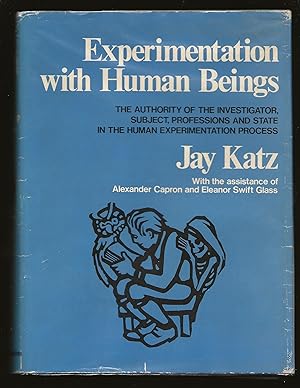Jay Katz Assistance Alexander Capron (1 results)
Product Type
- All Product Types
- Books (1)
- Magazines & Periodicals
- Comics
- Sheet Music
- Art, Prints & Posters
- Photographs
- Maps
-
Manuscripts &
Paper Collectibles
Condition
- All Conditions
- New
- Used
Binding
- All Bindings
- Hardcover
- Softcover
Collectible Attributes
- First Edition
- Signed
- Dust Jacket
- Seller-Supplied Images
- Not Printed On Demand
Seller Location
Seller Rating
-
Experimentation with Human Beings: The Authority Of The Investigator, Subject, Professions And State In The Human Experimentation Process (Only Signed Book)
Published by Russell Sage Foundation, New York, 1972
Seller: Rareeclectic, Pound ridge, NY, U.S.A.
Book First Edition Signed
Hardcover. Condition: Near Fine. Dust Jacket Condition: Very Good. 1st Edition. First Edition (NAP). Once listed, this will be the Only signed copy for sale anywhere on the Internet. Just for fun, I checked to see whether any of Dr. Katz's other books (he wrote and co-wrote quite a few) were signed by him. I couldn't find even one. The inscription is on the blank first front end paper. It reads: 'For Bob, with affection, Jay.' And underneath that (see photo) there's a word that I can't decipher, could be a place or a month, that's followed by '1972.' I tried to figure out who Bob might be. Bob Dylan? But I think the best bet is the Richard Dreyfus character in 'What About Bob? '. One would have to explain why Dr. Katz would in this one instance capitulate to his signature. It would take someone as relentless as Bob, someone who could break down even Bill Murray. I consider the fact that he was a fictional character irrelevant. But you are probably more concerned about the condition of the book. Happily it is very good. You can see the covers in the photos. They're very clean. The gilt lettering on the spine is quite bright. The edges and corners are in excellent shape. The page edges are very clean (one speck on the bottom edge). The spine is quite solid, quite an achievement facing 1159 pages. The book is, dare I say, very solidly bound. The pages are nicely tight from cover to cover. You can jiggle the covers to and fro if it pleases you, but they too are solidly bound (the front cover has a little give if you pull it from the side, but there are no cracks or spaces anywhere). The pages of this minor undertaking are in exceptional condition. I turned over everyone (not a chance) and I didn't find any instances of soiling. The white inside covers and endpapers are also very clean. Finally, there are no creases, no markings, no attachments, and the signed inscription is the only writing. The front cover of the jacket looks very good, very clean, just a little scuffing. Looks like there's a thin tear at the top edge of the spine, also a little scuffing and light color fade. The white rear has some foxing, maybe one small edge tear. The flaps look great, very clean, no tears. The jacket is not priced or clipped. I've always had it in a fitted protective cover. From the dust jacket: 'For the first time, this book presents materials organized around an analytical framework for comprehensive and systematic exploration of the human experimentation process. The book examines and evaluates the authority which should be vested in each of the chief participants in this process-- the investigator, the subject, the professions and the state-- as well as the problems for decisions which arise at its three basic stages-- the formulation of research policy, the administration of research, and the review of research and its consequences. Through case studies from medicine, psychology, sociology, biology and law as well as commentary from many sources-- philosophy, political science, economics, genetics, medicine, anthropology, psychoanalysis, biology, jurisprudence, psychology, theology, journalism and literature-- the volume explores the problem raised by human research and the attempts that have been made to resolve them. Alternative proposals, from allowing investigators a completely free hand to imposing centralized governmental control, are examined from both theoretical and practical perspectives. These and many other questions are presented to promote a greater conscious awareness and a relentless scholarly analysis of the conflicting purposes of human experimentation-- protecting man, advancing science, and improving the well-being of society and future generations. The ultimate goal of this book is to encourage students and decision-makers to sort out these conflicts, for only then can they begin to formulate rules and procedures which will minimize harm without erecting insuperable impediments to the acquisition of knowledge.' That's a mouthful. Who's got the smarts (and time) to take this on?. Inscribed by Author(s).


